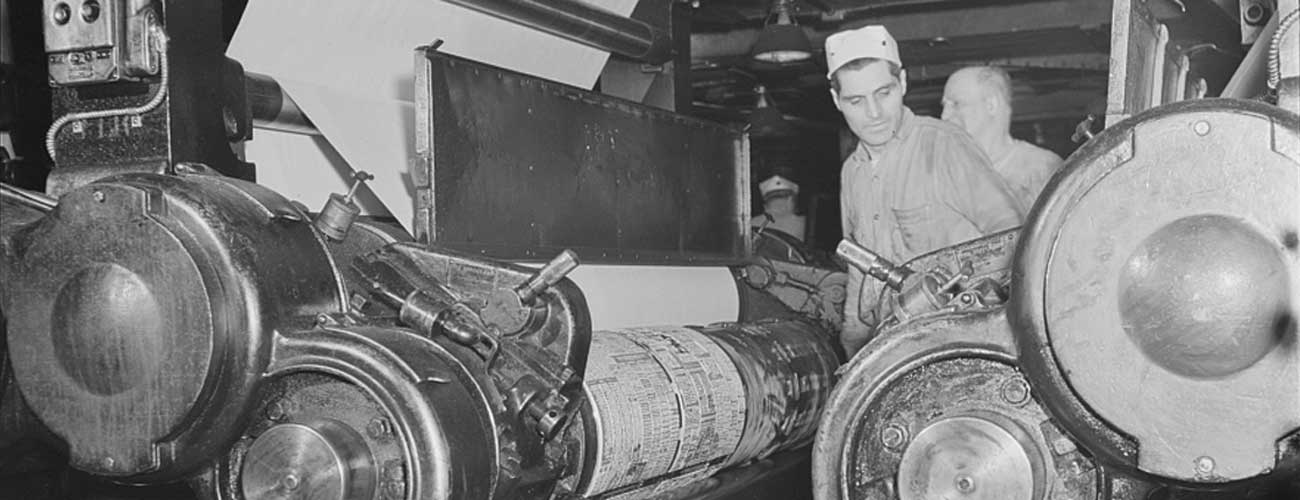In the wonderfully noir movie Deadline USA, Humphrey Bogart plays a newspaperman who battles corruption in New York City as he fights to keep his beloved newspaper from dying. In one of the final scenes, as the racketeer on the phone threatens Bogart’s character to prevent him from printing a story, he is disturbed by noises coming from Bogart’s end. “What’s that racket?” the gangster demands. “That’s the press, baby, the press!” Bogart replies. “And there’s nothing you can do about it. Nothing.”
The double entendre is perfect: The noisy “press” is literally starting to run, and the racketeer had no recourse against the “press” as the body of journalism.
But how apt is the term “the press” today?
This arises from a conversation among some CJR editors. “We fell into a discussion about the proper/improper use of the word press when referring to publishing stories online,” Christie Chisholm, CJR’s associate editor and production editor, said in an email; social media editor Sarah Grieco added, “I changed a line in a piece saying so-and-so ‘didn’t reach out before this article went to press, and I changed it to ‘before it was published’ ” (We’ve discussed the buzzword nature of “reach out” already.)
Nowadays, the majority of content released to the public is not run off a “press,” of course, but it is still “published.” In the ink-and-paper days, one would “print” or “publish” something; today, one can “post,” “publish,” “print,” or even “upload” something, though that last sounds too much like getting rid of a burden to qualify as an act of journalism.
“Press” still survives as a collective term for journalism: Companies and government entities still have “press offices” and issue “press releases”; The Associated Press has not changed its name, nor have many organizations focused on journalism, like the National Press Photographers Association, the World Press Freedom Committee, and the National Press Club. Not to mention the First Amendment.
Sure, we have “media,” but that sounds so clinical, not to mention the fights over whether to call “the media” “they” or “it.”
This Google ngram of the occurrences of “post,” “publish,” “press,” media,” and “print” in books (physical and electronic) may shed a little light, though it’s woefully inadequate, since all context is missing and it’s impossible to tell if the words are being used collectively or individually, or as nouns, adjectives, or verbs. But it shows a decided drop in uses of the word “press” between 1995 and 2008, and a rise and then dip of “media”:
It’s fine to say you “published” or “printed” something, even if it’s all done digitally. Publications can still “go to press” even if no ink or metal plates are involved, though “post” or “publish” is likely to become more ubiquitous as a reference to the individual pieces released to the public, as opposed to a publication “printed” all at once. Some of the terminology is generational: Someone who has never worked for a product produced on paper is less likely to use “press” to describe the act of publishing.
Even so, the “press” is unlikely to go away, any more than other anachronistic terms will. We still “hang up” our “phones” even when there is no handset to hang and our phones are really pocket computers; we still listen to “records” and “tape” programs with no physical presence; we still “carbon copy” people on emails even if we have no idea what “carbon paper” looks like.
Substitutes for “the press” lack the romance of the double meaning: “Take down that post” has less urgency than “Stop the presses”; A.J. Liebling would not have made much of a splash with “Freedom of the blog is guaranteed only to those who own one”; Bogie saying, “That’s the post baby, the post” through gritted teeth falls rather flat. Besides, the gangster would not have heard the “post” being “published” in any event: The ping of an incoming news alert just doesn’t carry the same weight as the thunder of the “press.”
Merrill Perlman managed copy desks across the newsroom at the New York Times, where she worked for twenty-five years. Follow her on Twitter at @meperl.

